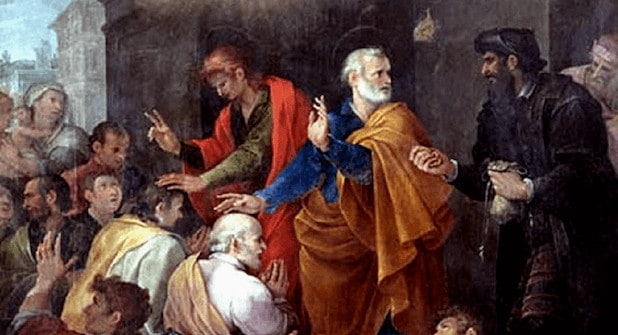The book of Acts is a favorite of preachers, so you are likely familiar with the showdown in Acts 8:9–24 between Peter and Simon the Magician. Luke tells us that Simon had practiced his magic in a city in Samaria where he had been hailed as “God’s Great Power.” Simon heard the gospel preached by Philip and believed, but later, after Peter’s arrival, he tried to purchase the power of the Holy Spirit from Peter.
His name consequently has not been remembered for any great deeds, but for the payment of money for church office (“simony”). But is that all there is to the story? Hardly. Don’t look away now or you’ll miss what’s behind the magic.
Simon, God’s Great Power
Let’s look at how a first-century audience would have comprehended the episode in its Samaritan setting. That Simon was referred to by the people of the Samaritan city as “God’s Great Power” is significant. That title comes from the Samaritan Targum—an Aramaic translation of the Samaritan Hebrew Bible, known as the Samaritan Pentateuch. In the Samaritan Targum, the Hebrew word ʾel (אל, “God”) is translated hela (חילא, “power”). God is then called “great” (רב, rab). Not surprisingly, “the Great Power” was used in Samaritan hymns and writings as a substitute for the divine name, much in the same way orthodox Jews say ha-shem (השם, “the Name”) instead of pronouncing the divine name Yahweh.
But how could the Samaritans speak of Simon as though he were God? Well, Simon was able to do amazing things. We aren’t told if what he was doing was something he picked up learning magical trickery or enablement from a demonic power, but the effect was the same. Second, the plural of “power” (helin) was also used by Samaritans of angels. Like many Jews and Christians, Samaritans considered one particular angel—the one in whom Yahweh’s name dwelled (Exod 23:20–23)—as the embodied Yahweh. Since this angel was viewed as a physical manifestation of the true God—the “Great Power”—Simon’s acts of magical power had convinced many Samaritans that he, too, was a fleshly manifestation of God.
It’s easy to see how Luke, writing in full knowledge of the incarnation of God in Christ, would have sought to use this encounter. The drama is palpable. Philip had taken the message that God had become man in Jesus Christ to Samaria, where they already had their own incarnate deity, Simon the Magician, “God’s Great Power.” Incredibly, Luke records that the power of the gospel broke through to Simon, moving him to embrace the message of Philip. And when he saw the signs and miracles Philip performed, “Great Power” was drained. So much for all that Hogwarts tuition!
The Real Great Power
From Luke’s account, Simon must have realized very quickly that his own repertoire of tricks, however stunning they were to the masses, fell far short of what he had seen from Philip. Simon’s conversion reads quite genuine. Luke is careful to note, though, that Simon saw the powerful deeds of Philip only after he believed, when he began accompanying Philip in the city (Acts 8:13). But he hadn’t seen anything yet.
Luke tells us that when the apostles at Jerusalem heard that the gospel had reached the Samaritans—a people hated by “pure” Jews for centuries (John 4:9)—they sent Peter and John not to investigate whether it was true, but to pray for the Samaritan believers that they might receive the same Holy Spirit (Acts 8:14–17) that had abided with them since the explosion of the gospel at Pentecost (Acts 2). This alone is a powerful message. Two Jewish men who had grown up with their own prejudices about the Samaritans didn’t doubt that the grace of God included people they had scorned. Nothing Jesus had promised was to be withheld from them.
Unfortunately, Simon had a lot to learn about the real Great Power. When Simon saw that the Samaritans upon whom Peter and John laid their hands had received the Holy Spirit (no doubt evidenced in some tangible, powerful way), he wanted to experience that power himself. That’s understandable. But where he went wrong was trying to pay for it (Acts 8:18–19). Peter rebuked him harshly, and Simon repented immediately (Acts 8:20–24).
Nevertheless, Simon’s name lives on in infamy. Because of his on-the-spot repentance, not to mention the fact that he’d probably only been a believer for at most a couple of weeks, it seems unreasonable to vilify Simon. In Simon, we have a man who was one day hailed as the incarnate God but the next repented at the words of a couple of fishermen. We should remember the broken heart more than the misguided gesture.
***

This article is excerpted from Dr. Heiser’s book I Dare You Not to Bore Me with the Bible.
Discover more fascinating aspects of the Bible with Dr. Heiser
Keep exploring the strange, perplexing, and mysterious aspects of the Bible with these excerpts from Dr. Michael S. Heiser’s The Unseen Realm: Recovering the Supernatural Worldview of the Bible. Or dive deeper into the supernatural world of the Bible and pick up a copy of The Unseen Realm today.





